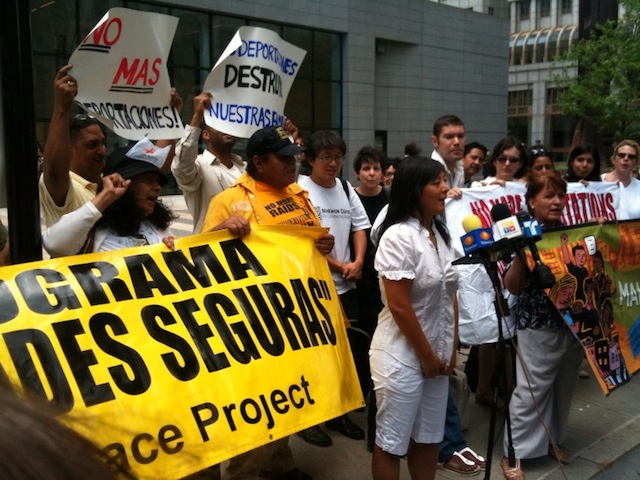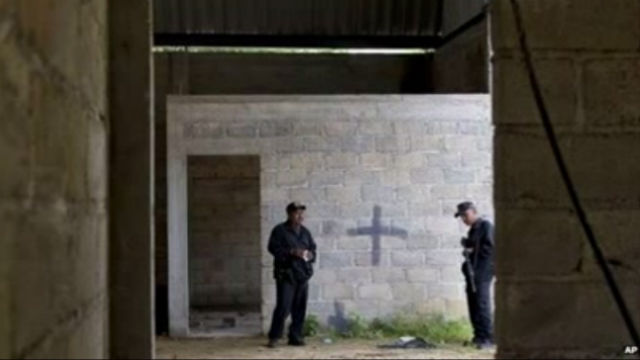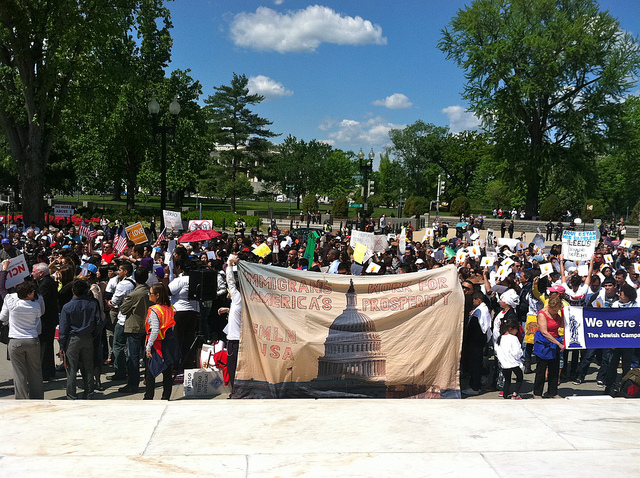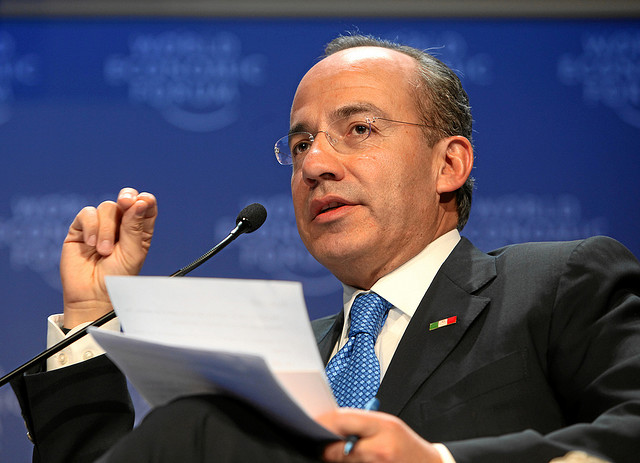
Dispatches, United States
Immigration Reform Activists And ICE Reach Impasse Over Secure Communities
July 24, 2011 By Roque Planas
Such outreach meetings between ICE and New York’s immigration reform activists take place routinely, according to Jackie Esposito of the New York Immigration Coalition.
“Not much progress is made as a result of these meetings,” Esposito said in a telephone interview after the July 15 meeting with ICE. “Today was really to make clear that any sharing of data is unauthorized.”
Cristina Aguilera, a campaign organizer at the Massachusetts Immigrant and Refugee Advocacy Coalition, who attended a similar meeting in Boston, echoed the sentiment.
“It was a lot of talking from them and very little opportunity for asking follow up questions,” Aguilera said in a telephone interview. “I think they are a little bit disconnected from the ground and the people they are affecting with their program. We were there to try to connect them with that, but it just felt like a monologue.”
ICE declined to comment on the meetings for this article, but forwarded a press release saying that in New York the agency had discussed “a new ICE policy designed to mitigate possible impacts on community policing by preventing the removal of victims of domestic violence and other crimes.”
The release notes that ICE created an advisory committee last month that will make recommendations on how to focus the program on deporting those who present a threat to public safety or national security. The committee’s first report is scheduled for release some time in the next two to three weeks.
While activists and ICE officials appear to have reached an impasse, the program continues to barrel ahead.
The Department of Homeland Security (DHS) told those at the New York meeting that local law enforcement agencies continue to share fingerprint data with ICE in jurisdictions of the state where Secure Communities had been activated before Governor Andrew Cuomo’s decision to withdraw, according to a press release from the New York Immigration Coalition. Secretary of Homeland Security Janet Napolitano continues to insist that the program will become mandatory by 2013.
The conflict over Secure Communities could have political implications for President Obama, who faces growing disenchantment among the Hispanic supporters who turned out in record numbers to vote for him in 2008.
Secure Communities was developed as a way to prioritize the deportation of unauthorized immigrants who commit serious crimes and President Obama embraced it, hoping it would help show his critics that he is committed to enforcing immigration law.
But a majority of those deported through the program did not commit serious offenses, according to ICE data. From the time of its creation in 2008 until March of this year, 55 percent of those processed for deportation through Secure Communities were either convicted of minor infractions or were arrested without being convicted.
The result is that the Obama administration annually deports more immigrants than any president before him and has taken charge of expanding an enforcement program unpopular with Hispanics, even as he has failed to make any progress on immigration reform.
It’s a losing strategy for cultivating Latino voters, says Angelo Falcón of the National Institute on Latino Policy. Obama hoped to bring Republicans to the table for a deal on immigration reform by acting tough on enforcement. “That’s not happening at all,” Falcón told the Latin America News Dispatch.
With no Republicans emerging as strong candidates for Latinos, Obama does not have to worry about losing many voters, according to Falcón. Instead, Obama needs to worry about the rate of turnout, particularly if he loses significant support from his white, non-Hispanic base. “The question is, can he mobilize Latinos to come out in large numbers?” Falcón said.
A poll released by Impre Media and Latino Decisions last month showed that only 49 percent of Latinos were sure they would vote for Obama in next year’s presidential election – a steep drop from the 67 percent who voted for the Obama-Biden ticket in 2008.
The same poll showed that Latinos consider immigration reform their most important issue by far. Some 51 percent of respondents said immigration reform and the Dream Act were the most important issues the president and Congress should address, followed by the unemployment and education, each with 18 percent.
“It’s not clear how enthusiastic Latinos are going to be come 2012.” Falcón said.





9 Comments
FOR THE GOOD OF THE ECONOMY, WE NEED TO PASS COMPREHENSIVE IMMIGRATION REFORM! YOU ARE HEARING THIS FROM A 32/WHITE RESPUBLICAN MALE!
You comment is good aand focus on social justice.the problem is not ICE.The USCIS really needs to be abolished with the former INS restrctured.I do interviews which are marriege realted.We spend Govt RESOURCES FOR no reasons.
Obama hoped to bring Republicans to the table for a deal on immigration reform by acting tough on enforcement.
And that’s all it is-An act.
The taxpayers were taken advantage of in the 1986 amnesty. They were promised secure borders and an end to illegal immigration.
There will be no legalization of those who came illegally until we have e-verify, Secure Communities and a valid visa tracking system up and running as well as secure borders.
This time we’ll make sure the systems to control immigration are in place.
Then we can consider who should become a legal resident.
One of the reasons I will probably vote for Obama ONLY because he will be the only viable alternative. He sold Latinos off. His words were very cheap.
[…] Killer To Prison on Cuba: Havana 58 Years After The July 26 Moncada Attackcubana 1960 on Immigration Reform Activists And ICE Reach Impasse Over Secure Communitiescubana 1960 on Cuba: Havana 58 Years After The July 26 Moncada Attackcubana 1960 on Cuba: Havana 58 […]
“No adjustments that they make will ever be sufficient because Secure Communities is fatally flawed”
So since the racist illegal advocates will never be satisfied there is no reason for ICE to meet with them anymore. The racists whine at ANY enforcement. S-Comm doesn’t come into play unless an illegal is arrested, so they must commit another crime (besides being illegal and all the other laws they break) b4 their prints are checked. Illegals should be deported as found, no exceptions! I will never vote for anyone who helps to protect illegals! Deport them all !
yeah they better ***** do something quick cause they are effecting lots of families for dum stuff , they better look at the serious offenders , they era doing way to much harm to people , and also they way they are threat it ones they are in “ICE “….
there are taking peoples live and breaking lots of families for stupid **** !!! they need to do whats right and look at the time they have been there in the states , its not fair at ALL !!!!
Throughout the great US crime wave that started in 1960 and peaked in around 1990, the predominant approach of police was to focus limited resources of “major” crimes like murder and robbery and assault. There was little success with this approach. The tide finally turned when the Giuliani administration in New York city introduced the idea of arresting and punishing people for minor”street” crimes like verbal assault, littering and disorderly conduct. The tactic had dramatic effects because of something called the “broken window theory” which is an idea introduced in a 1982 article by social scientists James Q. Wilson and George L. Kelling. The broken windows theory is a criminological theory of the norm setting and signaling effects of urban disorder and vandalism on additional crime and anti-social behavior. The theory states that monitoring and maintaining urban environments in a well-ordered condition may prevent further vandalism as well as an escalation into more serious crime. It is clear from this theory that there is a very good reason for the secure communities program to deports aliens for minor crimes and misdemeanors. It will indirectly have a very large and beneficial societal impact and will greatly deter overall criminal behavior among illegal immigrants. It is very wrong to view this as unjust or inappropriate. It really works in practice, it saves lives, and it is the most cost-effective approach to maintaining a safe society.
Comments are closed.